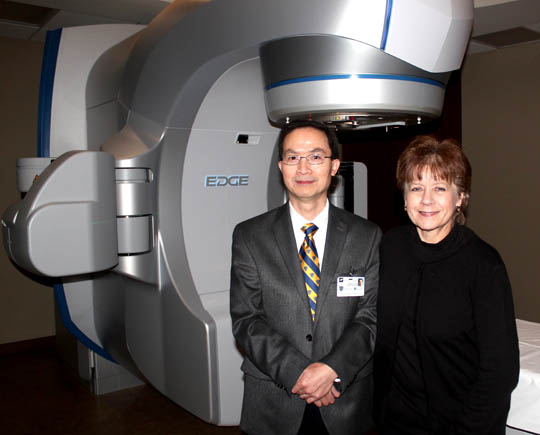Gerri Musser of Oregon, Ohio, didn’t think she would be around to celebrate Christmas and the New Year with her family.
“I am very lucky to be alive,” Musser, 62, said. “The odds were overwhelmingly against me.”

Dr. Changhu Chen and Gerri Musser posed for a photo in the Edge Radiosurgery Suite in UT Medical Center’s Eleanor N. Dana Cancer Center. Under Chen’s care, Musser received a 10-day, high-dose, targeted radiation treatment for a tumor in her pancreas, liver, stomach and bile duct.
“You hear awful stories about how it’s too late when symptoms of pancreatic cancer surface — people died within weeks,” Musser said. “I was at stage IV when they found it. The shocking diagnosis sounded like instantaneous death. They gave me six months to live.”
Musser said her cancer journey started when she couldn’t keep any food down and lost 23 pounds in six weeks. She went to her family physician to find out why she was so sick.
“The ultrasound discovered a tumor the size of a cantaloupe in my pancreas,” Musser said. “I was immediately referred to the Dana Cancer Center at The University of Toledo to see a specialist.”
Surgical oncologists took her into surgery, but couldn’t remove the tumor because they discovered it also had spread to her liver, stomach and bile duct.
Dr. Changhu Chen, radiation oncologist at the Eleanor N. Dana Cancer Center and professor and chair of the Department of Radiation Oncology in the UT College of Medicine and Life Sciences, said Musser had a less than 5 percent chance of survival.
“After the surgery, I told them three times, ‘I want to live, I want to live, I want to live,’” Musser said. “I will do whatever I have to do.”
The primary tumor in Musser’s pancreas continued to grow despite chemotherapy, so Chen and staff at the Eleanor N. Dana Cancer Center guided Musser through what Chen calls “unconventional treatment.”
“This is an exceptional case,” Chen said. “She responded so well, you could call it a miracle.”
Musser underwent a 10-day, high-dose, targeted radiation treatment.
“We offered Gerri a 10-day course of high-dose, intensity-modulated radiation therapy using a technology called stereotactic radiosurgery,” Chen said. “Instead of the traditional treatment of low doses on a region of the body for 25 to 30 days, we focused specifically on Gerri’s tumor for 10 minutes a day for 10 days with more than double the dosage using our Edge Radiosurgery Suite. We have had this machine for more than two years and have extensive experience with this fast and safe treatment.”
“It was aggressive treatment, and I’m happy to say it worked,” Musser said. “Dr. Chen dropped an atomic bomb on that big tumor in my pancreas, and the tumor has resolved. I had no side effects. I’m in a remission state and check in with my doctors every other month to make sure it doesn’t come back.”
Chen said Musser’s tumor is the largest for which he has had success using this treatment for pancreatic cancer. This technique is normally used for tumors less than 2 inches in size.
“Pancreatic cancer is a very deadly disease,” Chen said. “There has been no big breakthrough in treatment, no discovery of a method for early detection. I am glad we had good results from a devastating diagnosis in Gerri’s case.”
Chen said the Dana Cancer Center has had many successful treatments for patients with cancers other than pancreatic cancer using expertise and technology in radiation therapy at UT.
Musser, whose hair is growing back, savored every minute celebrating Christmas with her husband, children, grandchildren and great-grandchildren.
“I had great doctors, and I’m feeling good about making a fresh start for the New Year,” Musser said. “It’s a long road. I’m not done yet. It’s something I’ll have to live with for the rest of my life. However, I am prepared to fight again because I’d like to see my great-grandchildren grow up.”